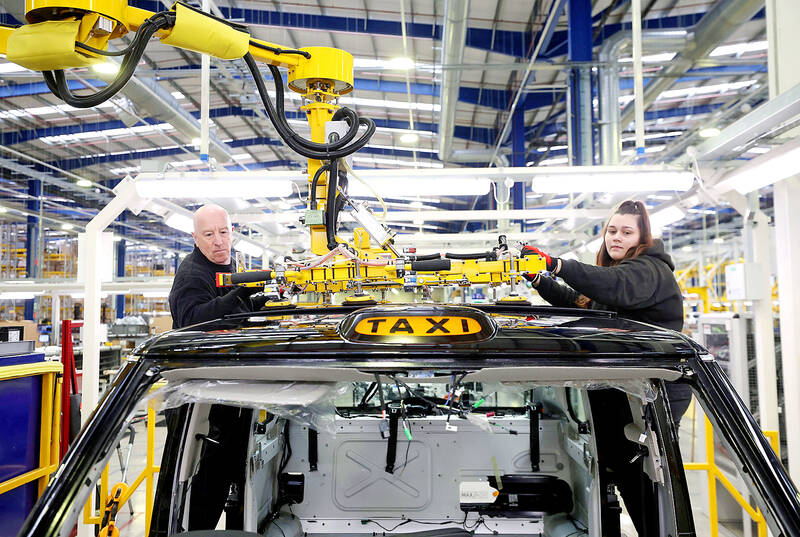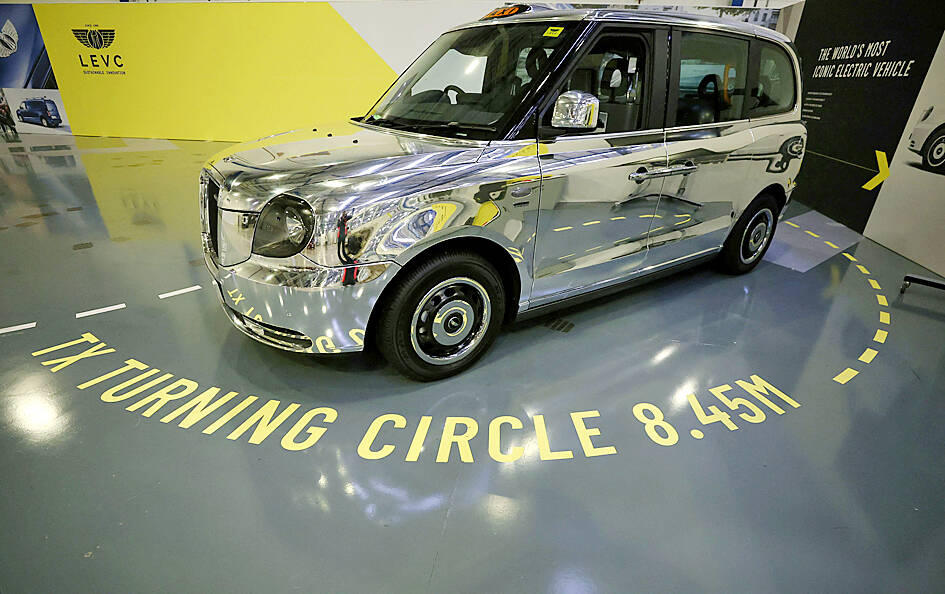China’s Geely Holding Group Co (吉利控股集團) is planning a big investment to turn the maker of London’s iconic black taxis into a high-volume, all-electric brand with a range of commercial and passenger vehicles, executives at the unit said.
London Electric Vehicle Co (LEVC) also aims to expand its suite of services, which include cars arranging their own maintenance and recognizing their owner’s interests to help them book activities.
“We need a developed product portfolio. We need to make big investments in terms of the technology and infrastructure,” LEVC chief executive Alex Nan (南聖良) said at the taxi maker’s headquarters in Coventry, central England. “Geely will make consistent investments into LEVC because this is a very unique project.”

Photo: Reuters
LEVC builds a hybrid taxi model that starts at around £66,000 (US$81,900), which has a battery providing 103km of range and a gasoline range-extender giving it a total range of over 480km. The company’s business was hit hard by the pandemic and it laid off 140 staff in October last year.
Nan said LEVC and Geely would seek to attract other investors to its zero-emission portfolio and would look to partner with other carmakers to develop new technology.
Executives said the size of Geely’s investment would be disclosed later. So far the Chinese group, which took full control of LEVC in 2013, has invested £500 million in it.

Photo: Reuters
“Geely fully supports the new transition strategy laid out by LEVC’s board and executive team,” Geely said in a statement.
In 2021, Geely launched a £2 billion investment in another unit, niche British luxury sports carmaker Lotus, to massively expand production of its sports cars and build high-end SUVs and sedans in Britain and China.
Geely is following a similar path in its plans to grow LEVC, executives said.
Britain’s EV ambitions were dealt a blow last week when startup Britishvolt, which had planned to build a major battery factory in northeast England, filed for administration.
“We need to make sure the UK environment as a whole is competitive and has its position on the world stage,” LEVC managing director Chris Allen said.

Taiwanese suppliers to Taiwan Semiconductor Manufacturing Co. (TSMC, 台積電) are expected to follow the contract chipmaker’s step to invest in the US, but their relocation may be seven to eight years away, Minister of Economic Affairs J.W. Kuo (郭智輝) said yesterday. When asked by opposition Chinese Nationalist Party (KMT) Legislator Niu Hsu-ting (牛煦庭) in the legislature about growing concerns that TSMC’s huge investments in the US will prompt its suppliers to follow suit, Kuo said based on the chipmaker’s current limited production volume, it is unlikely to lead its supply chain to go there for now. “Unless TSMC completes its planned six

Intel Corp has named Tasha Chuang (莊蓓瑜) to lead Intel Taiwan in a bid to reinforce relations between the company and its Taiwanese partners. The appointment of Chuang as general manager for Intel Taiwan takes effect on Thursday, the firm said in a statement yesterday. Chuang is to lead her team in Taiwan to pursue product development and sales growth in an effort to reinforce the company’s ties with its partners and clients, Intel said. Chuang was previously in charge of managing Intel’s ties with leading Taiwanese PC brand Asustek Computer Inc (華碩), which included helping Asustek strengthen its global businesses, the company

Power supply and electronic components maker Delta Electronics Inc (台達電) yesterday said second-quarter revenue is expected to surpass the first quarter, which rose 30 percent year-on-year to NT$118.92 billion (US$3.71 billion). Revenue this quarter is likely to grow, as US clients have front-loaded orders ahead of US President Donald Trump’s planned tariffs on Taiwanese goods, Delta chairman Ping Cheng (鄭平) said at an earnings conference in Taipei, referring to the 90-day pause in tariff implementation Trump announced on April 9. While situations in the third and fourth quarters remain unclear, “We will not halt our long-term deployments and do not plan to

The New Taiwan dollar and Taiwanese stocks surged on signs that trade tensions between the world’s top two economies might start easing and as US tech earnings boosted the outlook of the nation’s semiconductor exports. The NT dollar strengthened as much as 3.8 percent versus the US dollar to 30.815, the biggest intraday gain since January 2011, closing at NT$31.064. The benchmark TAIEX jumped 2.73 percent to outperform the region’s equity gauges. Outlook for global trade improved after China said it is assessing possible trade talks with the US, providing a boost for the nation’s currency and shares. As the NT dollar